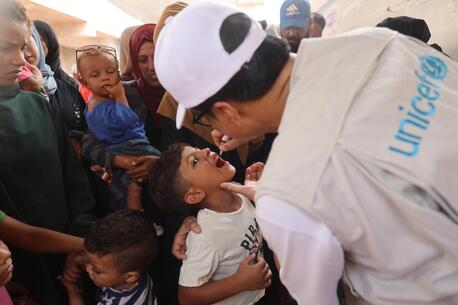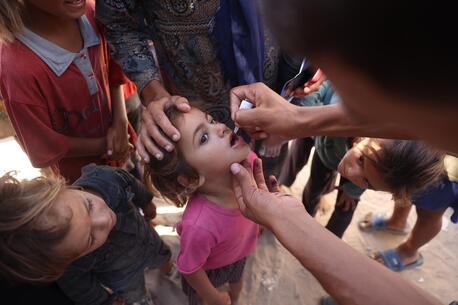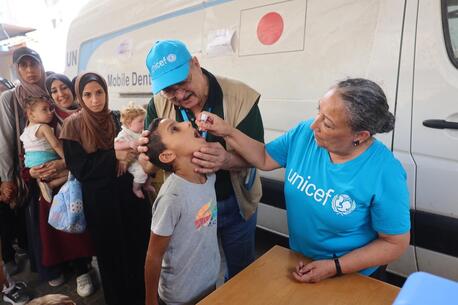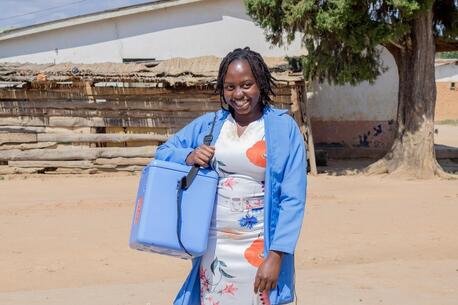
UNICEF's Catherine Russell: Women Are the Key to Eradicating Polio
UNICEF Executive Director Catherine Russell on the longstanding partnership between Rotary International and UNICEF and next steps in the fight to eradicate polio worldwide.
Since Rotary International and UNICEF joined forces in 1988 as two of the founding organizations of the Global Polio Eradication Initiative (GPEI), the world has gone from 125 polio-endemic countries to two, Afghanistan and Pakistan. There were an estimated 350,000 cases of paralytic polio in 1988 and only 12 in 2023. And since the partnership’s inception, The Rotary Foundation has donated $1 billion to UNICEF — a milestone celebrated at an event in New York City in January 2024. To mark the occasion, Rotary magazine interviewed UNICEF Executive Director Catherine Russell about what that funding supports, why Rotary and UNICEF make great partners and what’s ahead for polio eradication.
What role does UNICEF play in the Global Polio Eradication Initiative?
CATHERINE RUSSELL The Global Polio Eradication Initiative is one of the greatest examples of a successful public-private partnership for public health. Together with Rotary International and other partners, we are working to eradicate polio and ensure no child suffers from a disease that we know how to prevent. UNICEF focuses on providing timely, safe and adequate quantities of the polio vaccines to countries all over the world. But vaccines work only if children receive them. And that’s where our other area of work is critical: engaging with local communities to build trust and confidence in the polio vaccine among mothers, fathers and caregivers. This entails mobilizing nationwide networks of community health workers, influencers and volunteers — the majority of them women — in polio-affected countries. We cannot do it alone, however, and this is where Rotary members play a leading and critical role.
In some of the communities in Afghanistan and Pakistan that are at highest risk for polio, we work with national authorities and civil society partners like Rotary in combining polio vaccination with the delivery of a suite of health, immunization and other basic services. This is not only helping increase vaccination coverage but also contributing to the overall health and well-being of disadvantaged children. Our work together has laid the blueprint for tackling other pressing diseases and strengthening health emergency response systems.
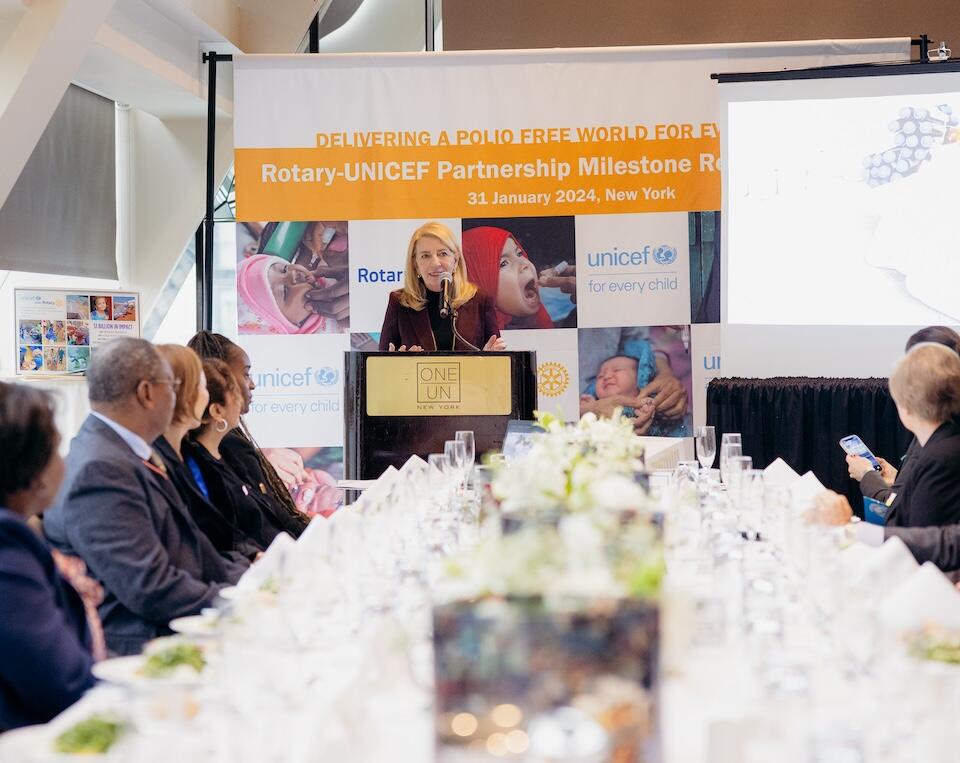
Rotary has given $1 billion in grants to UNICEF since the inception of the program. How do those grants support UNICEF’s work?
CATHERINE RUSSELL Rotary is one of our strongest partners, and we are grateful for the steadfast support to UNICEF’s polio eradication efforts. Contributions from Rotary and its members over the past three decades have contributed significantly towards UNICEF’s procurement and distribution of over 1 billion doses of polio vaccines annually, accounting for more than 50 percent of global oral polio vaccines. In addition, Rotary funds enable us to build the capacity of health workers in managing the “cold chain,” to keep vaccines safe during transportation and storage, and invest in vaccine supply chain infrastructure such as freezer rooms, refrigerators, cold boxes, vaccine carriers, and temperature monitoring devices.
Funds from Rotary and the partnership with local Rotary clubs in many countries have helped us recruit, train, and establish nationwide networks of locally based community mobilizers and volunteers in polio-affected countries. They are leading the charge against the disease, working with local communities in reaching children with life-saving vaccines in the most vulnerable and disadvantaged communities.
The best partnerships always support more than just funding. Rotarians help with community mobilization and outreach, building trust in vaccines, combating misinformation, and motivating caregivers to vaccinate their children. Rotarians have also played an invaluable role in relentlessly advocating to make polio eradication and childhood vaccination a top priority with local and national governments.
You’ve spent much of your career developing policies and programs to support women and girls. How can polio eradication efforts contribute to their empowerment?
CATHERINE RUSSELL Just a few decades ago, the notion of a woman going door to door, meeting mothers and caregivers, and vaccinating children against polio was unacceptable in many communities worldwide. However, today most community health workers globally are women. In fact, they often have greater access to children compared to their male counterparts, particularly in regions where social norms restrict male health workers from entering households and interacting with female caregivers. Over time, women in the polio eradication program have not only increased access to children but also positively influenced the status of women in society.
Women are often the heart and soul of the health care workforce, and advancing gender equality lies at the core of our effort to end polio. We are working to overcome barriers in reaching every child with vaccines, while at the same time empowering women across all levels of the global polio eradication effort — from decision-makers to frontline workers. We cannot achieve universal health care and the Sustainable Development Goals more broadly if we do not address gender inequities in the health workforce. UNICEF will continue to prioritize programs that advance gender equity and we’re grateful to have a partner like Rotary who shares that commitment.
Afghanistan and Pakistan, the two remaining polio-endemic countries, each reported six cases of wild poliovirus infection in 2023. What does that mean for how we approach the program in 2024?
CATHERINE RUSSELL Today, we are tantalizingly close to eradication. The wild poliovirus is confined to a few districts in Afghanistan and Pakistan, marking the most significant progress against the disease in history. This is a critical year, and we are doubling our efforts to reach unvaccinated children. Our strength lies in forging partnerships and engaging local leaders and influencers, and their support becomes even more crucial now as we navigate the final battles against the wild poliovirus. Rotarians’ continued commitment is crucial.
During this final phase towards eradication, we are also integrating polio with the delivery of health and routine immunization services, which is pivotal to reaching every child. This is particularly important in areas where access has been challenging. Only with a strong routine immunization and health system can we achieve and sustain a polio-free world. We are just as committed in our efforts to stop outbreaks of the variant poliovirus, the majority of them occurring on the African continent. We are especially focusing our efforts in the four geographies where children are at the highest risk of encountering and spreading the virus: eastern Democratic Republic of Congo, northern Nigeria, south-central Somalia, and northern Yemen.
What gives you hope that polio eradication is possible?
CATHERINE RUSSELL It’s simple for me: The dedication and heroic efforts of frontline workers globally and the unwavering commitment of donors and partners like Rotary, who will not stop until we reach every child. This is what makes me believe that together we will make polio history.
I would like to personally thank each and every Rotary member for your unwavering dedication and commitment to polio eradication. Last year, we saw one of the fewest number of wild polio cases recorded, thanks to your generosity. We are close to achieving our shared goal of a polio-free world, and we cannot afford to relent in our efforts. Members of Rotary are people of action and so are my colleagues at UNICEF, and we know that together we can continue to solve so many of the problems facing children today.
Learn more about UNICEF's partnership with Rotary International.
This Q&A was originally published by Rotary International.
HOW TO HELP
There are many ways to make a difference
War, famine, poverty, natural disasters — threats to the world's children keep coming. But UNICEF won't stop working to keep children healthy and safe.
UNICEF works in over 190 countries and territories — more places than any other children's organization. UNICEF has the world's largest humanitarian warehouse and, when disaster strikes, can get supplies almost anywhere within 72 hours. Constantly innovating, always advocating for a better world for children, UNICEF works to ensure that every child can grow up healthy, educated, protected and respected.
Would you like to help give all children the opportunity to reach their full potential? There are many ways to get involved.



